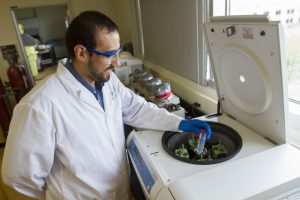M.S. in Environmental and Resource Management

 Many of the students in the master’s program are working professionals from across the country or around the world who are typically enrolling part-time, taking two courses per semester and graduating in two years. The MS in ERM has four culminating experience options: a thesis, an applied project, or coursework only with a comprehensive written exam or a portfolio at the end of the program.
Many of the students in the master’s program are working professionals from across the country or around the world who are typically enrolling part-time, taking two courses per semester and graduating in two years. The MS in ERM has four culminating experience options: a thesis, an applied project, or coursework only with a comprehensive written exam or a portfolio at the end of the program.
Students come with a variety of undergraduate degrees ranging from the sciences (chemistry, biology, geology, environmental science, and others) to engineering, industrial hygiene, or public policy among others.
Focus Areas and Concentration
Students in the M.S. in ERM degree can concentrate their studies in two focus areas:
- Environmental management
- International environmental management and sustainable development
Students are able to apply for a concentration in Water Management or pursue a focus area in either Environmental Management or International Environmental Management and Sustainable Development.
Core classes for the master’s degree with focus areas in Environmental Management or International Environmental Management and Sustainable Development include:
- Environmental Law
- Toxicology
- Chemistry of Hazardous Materials
Course Work
Depending upon the focus area, students also take classes in:
- Air Pollution
- Soils and Groundwater Contamination
- Water/Wastewater Treatment Technologies
- Hazardous Waste Management
- Industrial Hygiene
- Environmental Health
- Environmental Chemistry
- Environmental Leadership
- International Environmental Law and Policy
- International Environmental Management
- Sustainable Development
- Tribal Environmental and Natural Resources Management
Elective coursework from other ASU departments may be included in the program of study upon approval.
Water Management Concentration
Required classes for the concentration include:
- Environmental Law
- Toxicology
- Water Law and Policy
- Water/Wastewater Treatment Technologies
- Soils and Groundwater Contamination
Elective coursework from other ASU departments may be included in the program of study upon approval.
Admissions Requirements
Admission requirements
Applicants must meet the following admission requirements:
- Minimum of an earned U.S. bachelor’s degree or higher from a regionally accredited institution or the equivalent of a U.S. bachelor’s degree from an international institution that is officially recognized by that country in environmental engineering, environmental and resource management, biology, chemistry, geology, environmental health, environmental management, environmental science, occupational safety and health, environmental technology, industrial hygiene, natural resource management or a similar field.
- Minimum of 3.00 cumulative GPA (scale is 4.00=A) in their first bachelor’s degree program, or in the last 60 hours of a student’s first bachelor’s degree program.
- Minimum of 3.00 cumulative GPA (scale is 4.00=A) in a minimum of nine semester hours of graduate work from a U.S institution; or a cumulative GPA of 3.00 (scale is 4.00=A) from an applicable conferred master’s degree program in a regionally accredited college or university, if applicable.
- If the applicant does not meet the minimum GPA requirements, the application may still be considered. In certain cases, demonstrated aptitude through professional experience or additional post baccalaureate education will be considered.
- An online Graduate College application.
- Official transcript from each college or university attended. Applicants may upload legible unofficial transcripts as part of the online application; if admitted official transcripts are then required.
- No GRE requirement
- Submit a professional resume and personal statement as part of the online admissions application.
- Two letters of recommendation
- International applicants must also meet the English proficiency requirements, as defined by Graduate Admissions. Please be sure to review the TOEFL, IELTS, or PTE score requirements, as your application will not be processed without valid proof of English proficiency.
Degree Requirements
Degree requirements
The M.S. in Environmental and Resource Management requires a minimum of 30 credit hours. These credit hours must include the following:
- 30 credit hours and a thesis, or
- 30 credit hours including the required Applied Project course (EGR 593), or
- 30 credit hours and a portfolio, or
- 30 credit hours and a written comprehensive exam
Please refer to the MS Environmental and Resource Management Handbook located on the left side bar for additional information.
Professional licensure
ASU programs that may lead to professional licensure or certification are intended to prepare students for potential licensure or certification in Arizona. Completion of an ASU program may not meet educational requirements for licensure or certification in another state. For more information, students should visit the ASU professional licensure webpage.
Accelerated Master’s Degree program
This degree is offered as an accelerated degree with the M.S. in Environmental & Resource Management. The accelerated bachelor’s and master’s degree is designed to provide selected high-achieving students with the opportunity to combine advanced undergraduate coursework with graduate coursework and accelerate graduate degree completion. This program allow accelerated students to obtain a bachelor’s and master’s degree within five years.
Acceptance to the graduate program requires a separate application. Eligible students will be advised in their junior and senior years by their academic department to apply. To review eligibility requirements, please visit: Polytechnic School Accelerated Master’s Degree Programs
STEM-designated
STEM designation makes students within the program at ASU eligible for STEM specific Scholarships, OPT extension for International Students, and expanded GI benefits for Student Veterans.